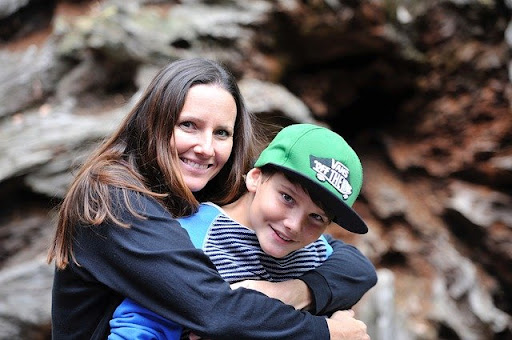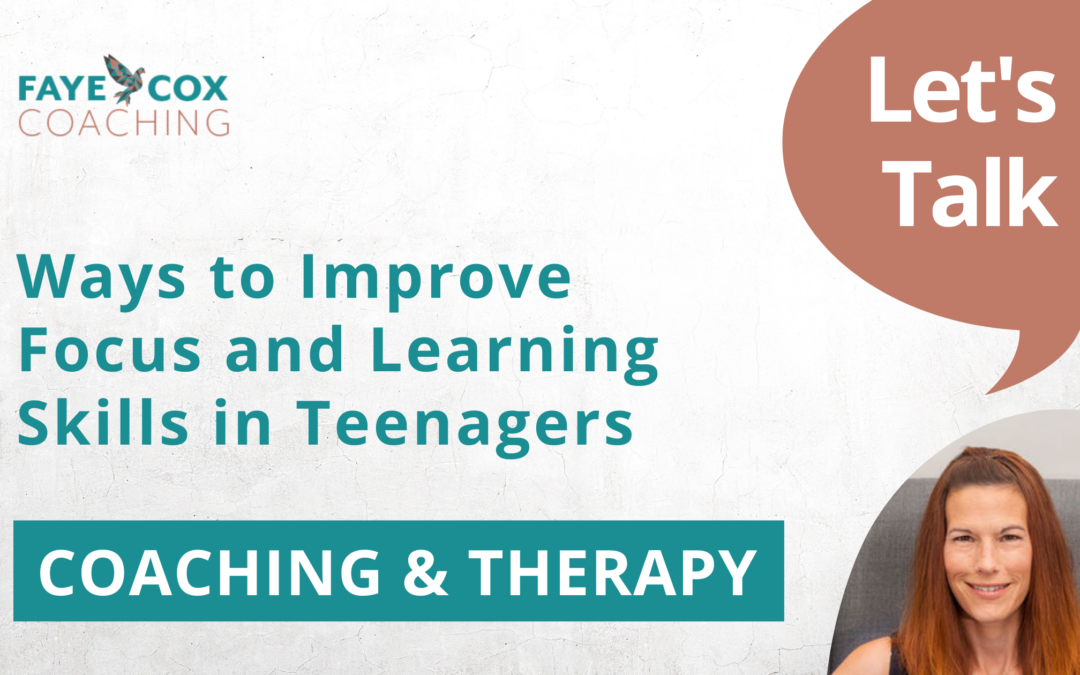
by Faye Cox | Nov 20, 2022 | Anxiety, Family, Parents, Teens, Tips
You may have noticed that there are some days when your teenager comes home and tells you everything about their day. They’ll be feeling motivated, have clear focus and can tell you some of the things they learnt that day. On other days, however, you’ll get grunting, vacant looks and you may even feel like they can’t even hear you talking at all.
These days can feel difficult for both of you. They may come home and genuinely not remember much of what’s happened in their day. It’s not deliberate so please don’t take it personally. It may be that your teenager has something else going on that is consuming their minds or their attention has been focused elsewhere for some reason.
We all know that if something really catches our interest then we will shift our entire focus to it, but if it’s not a subject we’re fully invested in then we can lack focus and attention for any length of time and it’s no different for our teenagers. In fact, with everything that’s going on in their everyday lives, including their brain development and hormones, it’s no wonder that some days they’re a little all over the place.
Having worked with teenagers for many years now I am here to support you to support them in the best ways you can and here are some ways to help them improve their focus and learning skills.
These will also help those with ADHD.
Keep the following points to hand when your teenager is doing their homework and needs to fully focus
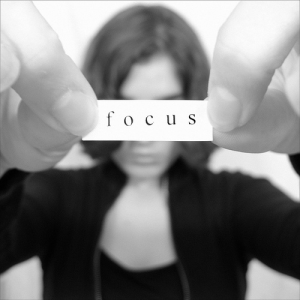
Create a distraction-free space for their learning
Make a designated space where your teenager knows they can go and do their homework in peace. Having a specific space enables them to take themselves away, whilst letting everyone else know that it’s time for them to focus and get on with their work.
Create a space that is well ventilated and lit, ideally with natural light if possible and away from everyone else so there is less noise from the TV or other family members. Your teenager may find white noise effective for helping them focus. Certain music playing quietly can also assist focus. Having one ear-pod in whilst working can be useful. This is one I see a lot with the teenagers I work with.
Be sure to put any other devices, gadgets, computer games and any other distractions away from your teenager at this time. These can become a huge distraction if within their eye line.
Once that task is over, encourage your teenager to put away everything that they have used before starting the next task and then get out everything they need for the next task. This way they only have what they need within their eye line.
Give your teenager a drink and some snacks to see them through and keep their blood sugar level up and to make sure they are hydrated whilst they work.

Grounding before homework
Before your teenager begins their homework, they can do a quick and highly effective grounding meditation to help prepare them for learning.
Grounding is an amazingly effective method to help clear the mind of any clutter that may be hanging around from the day. You can do this with them if you like as you will both benefit from it as it will also help to rid you and your teenager of any stress or tension you may be holding on to.
Here is a simple grounding meditation for you both to try.
- Sit down on the floor with your legs crossed
- Close your eyes and focus on your breath
- Simply notice the inhale and exhale of your breath
- Then make the inhales and exhales a little longer and deeper
- Feel yourself connect with the core of the earth and feel a complete sense of grounded-ness whilst picturing yourself as a tree with vast roots that are growing and reaching the centre of the earth.
- Bring your awareness back to the breath
- Take 3 long and deep inhales and exhales and come back to your awareness of the space around you
- Count to 5 and open your eyes
Notice how calm and grounded you feel ready to focus

Always set realistic goals for learning
Support your teenager to break down their tasks into manageable chunks and even use a brain dump to help them start a new task. Many people find starting a new task and transitioning between tasks difficult, so using a brain dump can help to get everything out of their head so they can break down what needs doing and how. This will free them from the overwhelm of it all.
Encourage your teenager to steer well clear of multi-tasking as this will escalate their overwhelm and create stress and anxiety. Plus, they won’t be able to do any of the tasks well and one task done well is worth more than two or three tasks done badly.
Use a planner to plan out homework with dates of when it will be completed by. Have set days and times as this will encourage good routine when it comes to learning.
Make sure that they are taking regular breaks from learning as this will increase productivity and focus. I encourage my teenagers to use the Pomodoro technique which involves full focus for 25 minutes and then a 5-minute break. Find what works best for your teenager as different things work for different people.
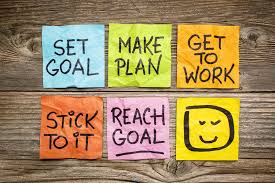
Remember that everyone is different, and these are just a few suggestions from my experience of working with teenagers who struggle with focus, anxiety and overwhelm when it comes to schoolwork and homework. These strategies have been very effective over the years. If your teenager is struggling in any of these areas, you can arrange a call with me to see where I can further support them.
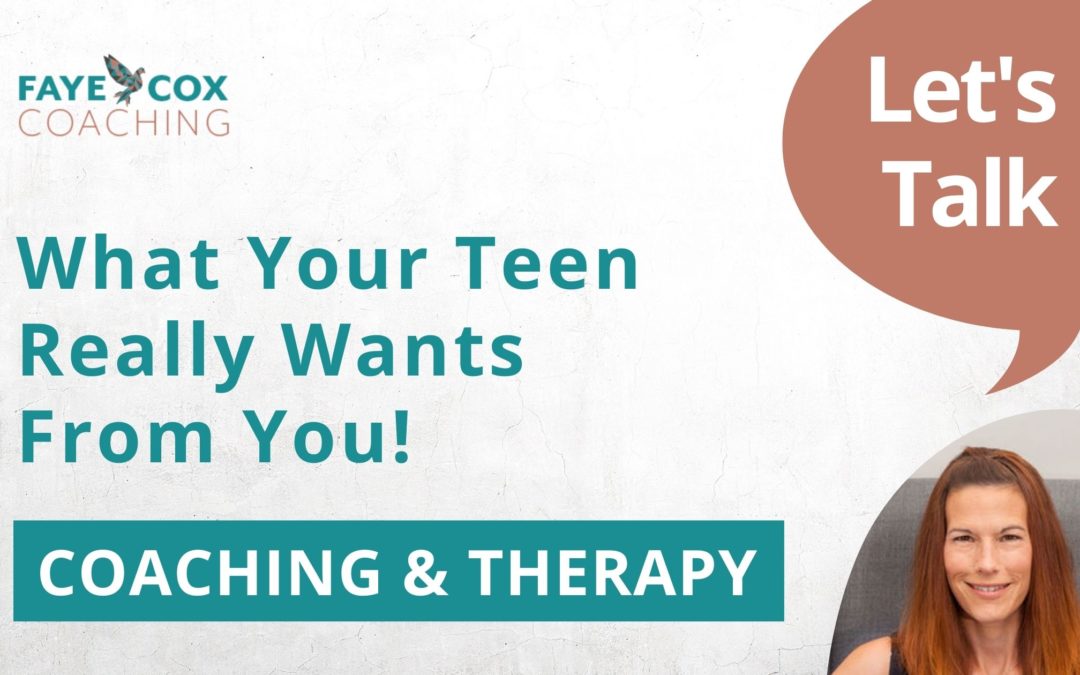
by Faye Cox | May 30, 2022 | Coaching, Family, NLP, Parents, Teens, Therapy, Tips
What your teen really wants from you
What your teen really wants from you is for you to listen and understand them. This blog explains how your teenager’s mind works and what they really want from you. Including helpful tips, resources, and NLP exercises to help you shift your perspective and improve communication with your teen.

Why are you here?
I’m guessing it is because you’ve either reached the end of your tether with your teen? Or you want to make sure you’re supporting them in the best way you know how? Or even BOTH?
Hopefully this blog will help you to start making some progress towards understanding what your teen really wants from you.
Meeting their physical and emotional needs
I have been working closely with teens and their parents for some years now, both one-to-one and in groups, in both an education setting and in their own personal space. I have seen the effects that a teens’ education and mental health is having on their daily lives.
I’ve worked with teens and young people with high anxiety, anger, low self-esteem and confidence, dyslexia and ADHD and they all have one thing in common and that is to have their basic physical and emotional needs met and feel fully supported in a way that they feel in control of their own lives!
How a teenagers mind works
Firstly, in understanding what your teen really wants from you, I want to give you some background on how a teenagers and young persons mind works, so that both you and your teenager can better understand why they do the things they do.
It is important to be aware of where your teenagers brain development is at, which makes it easier to understand their behaviour and thought processes.
As a result your teenager may seem incredibly grown up and sensible one minute and then the next seem completely illogical and impulsive. Almost like they’ve been replaced by aliens.

Brain development
Between the ages of 0-7 is the key stage of a child’s positive brain development, where they form their early belief system. Children are like sponges they take in everything that goes on around them.
The next development phase is when they hit puberty, this is different for each child, but in general it’s around 11-12 years of age, and continues until the mid 20’s.
As adults our pre-frontel cortex is fully developed allowing us to think rationally, understand consequences, solve problems and control our impulses. Before the age of 25, we rely heavily on our ‘amygdala’ to solve our problems and make decisions. This part of the brain is associated with our emotions, impulses, aggression and instinctive behaviour.
Supporting teens and young people
Having spoken and supported many teenagers and young people over the years I am here to support you, to support them.
I’m not ashamed to admit that I got it massively wrong with my step-son. When he turned into an alien overnight I didn’t understand, I didn’t even try to. I let my ‘EGO’ get in the way (The EGO is a whole topic all on it’s own and one I support parents with in my coaching).
I didn’t change my parenting style to adapt to his needs and as a result we disconnected for far too long and if I could go back and do it differently, knowing what I know now, I would!
There are a few key things that your teenager wants from you
- For you to keep them safe. This is the number 1 basic need of all humans. They want you to remind them of the dangers with love and kindness instead of judgement and frustration.
- To show them love and support even when they’re in alien mode.
- To know you’re on their side and haven’t forgotten how tough those teenage years are.
But, the biggest thing your teenager or young person wants from you is… YOUR EARS!!!!
Yes, that’s right. The biggest thing they want from you is for you to listen, and I mean really listen. Listen to understand, not to reply, lecture, tell them they’re wrong.
Listen and Understand, without judgement
They want you to step back into their world and listen as if you’re there with them, sitting alongside them whilst they navigate this difficult and confusing time. To accept who they are, not what you think they are or want them to be.
They want to be heard and respected for having their own opinions in life. They want your FULL attention when they speak about what’s going on for them. They want to know that you GET IT and can see things from their perspective.
How to gain a better perspective
In this video I teach you a great NLP exercise that will help you to see another persons point of view in any given situation. Gaining better perspective can build confidence in all areas of your life, be it your relationships with your partner or kids, or in the workplace with colleagues or employees.
Meet them where they are
As adults we judge situations through our adult brain (the pre-frontel cortex) but in order to be fully present and connected with your teenager, you need to go back and meet them where they are – Why am I repeating this? Because it’s the key to staying connected.
The teenage years are about standing beside them and using a gentle hand to guide rather than leading them from the front like you would a younger child.
Let your teenager lead the way. Keep communication light and flowing. Remember the teenage years through their eyes not yours as an adult.
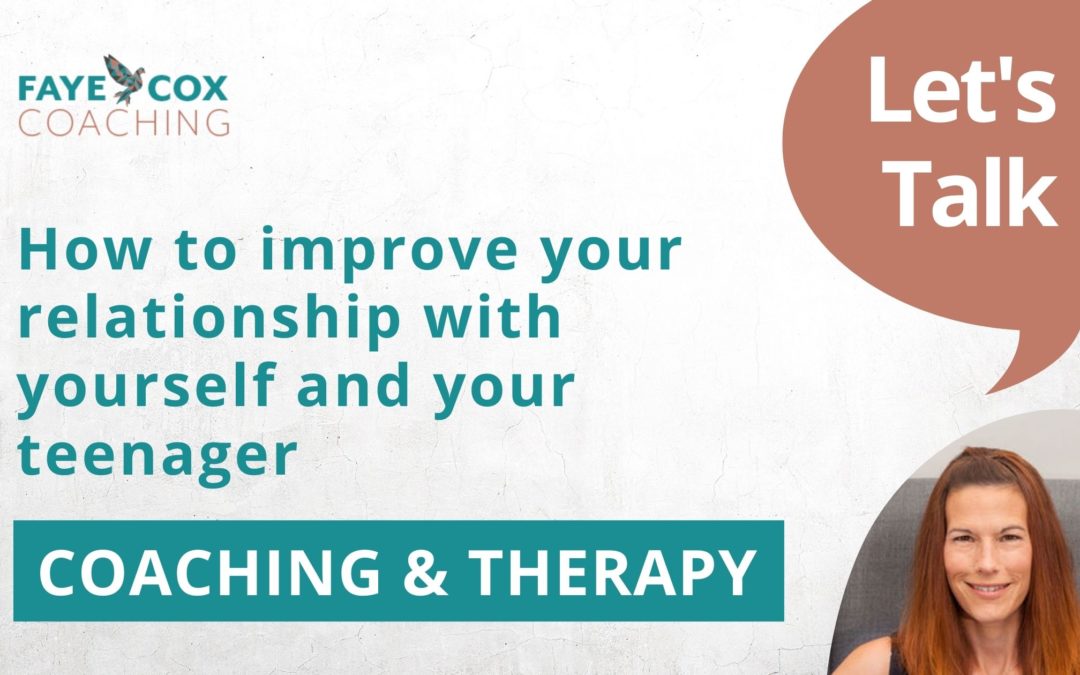
by Faye Cox | Apr 22, 2022 | CBT, Coaching, NLP, Parents, Teens, Therapy, Wellbeing
How to improve your relationship with your teenager?
As parents, we want quick, practical, and affordable and effective solutions. Coaching and therapy may seem like it is not, a quick or affordable solution but I’m here to explain why it absolutely is.
Many parents ask themselves these questions
How do I improve my relationship with my teenager? How can I communicate better with my teenager? How to parent a rebellious teenager? How to parent a teenager with depression? How to parent a teenager with Anxiety? How to parent a teenager with ADHD?
There’s so much information and advice out there, but it’s not always that helpful. Some methods will work for some and not for others.
My NEEDS audit sessions are designed to help you answer many of these questions, helping you to reconnect with your teen find the best solutions to overcome any stress and anxiety that you and your teen may be experiencing.
Working with me will improve your relationship both with yourself and your teenager
When most people think about coaching and therapy, they want to know what the benefits are. What exactly are they going to get for their money?
We know that when we purchase something completely tangible we’re getting a physical product or a visible service, but when it comes to coaching and therapy as humans we need to be able to see and feel the results, and most of the time we want to see and feel things FAST.
Well, I can tell you that working with me will enable you to see and feel change FAST. It would be wrong of me to say that results happen overnight because they don’t, but what they do, is create long-lasting change that can and will start from the very first session.
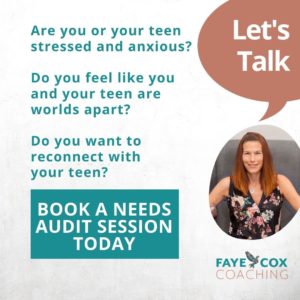
How do we work together?
Whether I’m working with you or your teenager or working with you together, my aim is always to give you a FASTER, deeper and longer-lasting effect.
We conduct a NEEDS Audit which brings huge insight into where you and your teenager are now, and where you’d like to be.
It also provides me with the foundation of our working relationship. This is where I will gather the information I need to support you in creating that long-lasting change. This forms the framework for the rest of our time together.
Then we go deeper into some of the unmet needs from the audit and put together an action plan. As well as putting some strategies in place you can use at home and even within school if needs be.
This is done through a series of 6 sessions, where I will carry out some sessions individually and some with you both. In the last session, I will bring you back together to talk through how things are going, and see where there may still need to be some suggestions and work.
What do you get from me?
During our time together, you get full access to me via WhatsApp and email for any queries or support needed in between sessions.
You will also receive a copy of each of my journals and a set of affirmation cards designed specifically for tweens and teens.
You will deeply benefit from going through the cards and exercises within the journals with your teenager as this will deepen your connection and communication even further.
You also get the benefit of my vast experience of working with teenagers and parents together, as well as my knowledge of using Coaching, NLP, and CBT effectively with this age group.
How long do we work together for?
We work together for 3 months, starting with the NEEDS Audit lasting 90 minutes, which is followed by 6 further sessions lasting approx. 60 minutes.
How much can I expect to pay to work with you?
I pride myself on offering affordable services as I believe that every young person and their family deserves to thrive.
I also offer affordable resources in my online shop such as my journals and affirmation cards, as well as some free resources.
For that, you will receive a FAST and long-lasting change to both yourself and them, whilst also creating a deeper connection through better communication.
Get in touch
If you have any further questions please call: 07968381793 or email faye@fayecoxcoaching.co.uk
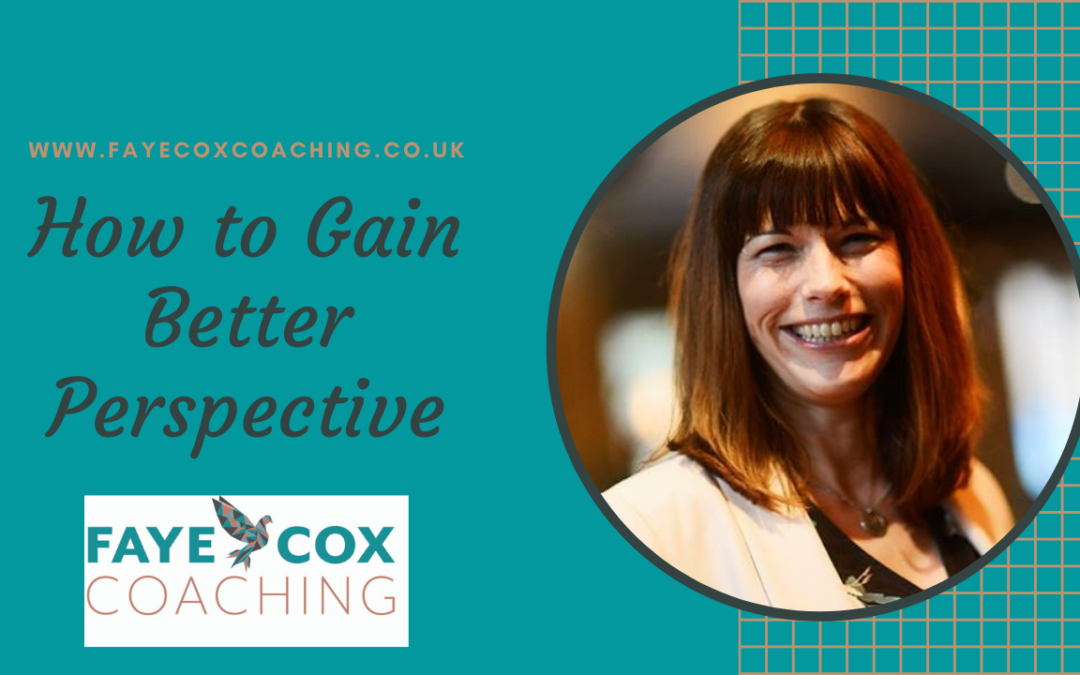
by Faye Cox | Jun 18, 2021 | Tips
Would you love to know how you can gain better perspective in any situation?
I’m here to tell you that it is possible and it’s a lot simpler than you may think.
We all find ourselves in situations where we may disagree with other people, and 9 times out of 10 when we’re in these situations we see things differently. We see things differently from the other person because of our map of the world, how we see things, our beliefs, our values and the experiences we’ve had in our life up until that point.
So today I want to give you a quick NLP (Neuro Linguistic Programming) technique that I use in my practice, to help you be able to see things from other people’s point of view, so you can put yourself in other people’s shoes in any situation. I call this the three pillars of perspective (also known as Perceptual Positions). You can physically do this and practice this technique over an over in preparation for when you find yourself in any given situation.
To start off with, there are three positions in the three pillars of perspective, position one, is you. That’s your position within any given situation or conversation, second position is the person you may be having that discussion with, It could be a situation at work, it could be something in your personal life, business, any given situation. A lot of the time you will find that this could be a 1 on 1 conversation, and you’re unable to see somebody else’s point of view. The third position, you are going to become a neutral participant within the conversation. You’re going to be the person who looks on the situation as an outsider, from a totally neutral perspective.

So how does it work?
To begin with, you can set up three different chairs in your living room, kitchen, at work in a conference room, wherever you happen to be. You can do this by yourself, you can also help your colleagues and employees do this, so when they’re in negotiations and communicating with other members of staff, or they’re trying to close a deal, any of those kinds of things, you can use this. Practise with them regularly.
Position 1 – Start off sitting in the first person’s chair so at this point you’re looking at things from your own perspective. Close your eyes and think of a situation that you may have found yourself in recently where you’re having a conversation, and the perspectives have been different, think back to the conversation that you were having and picture exactly what happened, what was said? How did you see things? How did the conversation go through your own eyes? Sit with that for a moment. Then I want you to do what we call in NLP which is break that state. So, open your eyes, think of something totally different, outside of the conversation, it might be what you’re having for dinner. It might be what your next meeting is. Just think about something entirely different.
And at that point, pick yourself up and move over to another chair, and this chair will be the second position.

Position 2 – Now you’re the other person in the conversation. When you’re ready, sit in that chair, close your eyes and put yourself in that person’s situation. Go back to the conversation, but this time you’re looking at it from the other persons. How did they see it? Imagine the situation from that person’s point of view, imagine stepping into their body and becoming them, and looking at you through their eyes, through their perspective and think back to what was said. What is their understanding of the situation? How did they see you and your actions in this situation? Once you’ve done that, open your eyes and break state again.
Now move to the third person’s chair.
Position 3 – Now you become the neutral third person. We are now the objective outsider. This person is somebody that you respect, somebody that you admire, somebody that you trust. We’re looking through their eyes now and seeing their perspective. Imagine that you’re watching this like a ‘fly on the wall’. Now it’s helpful here to picture yourself, to close your eyes and picture yourself as looking down on the conversation. We call ‘the helicopter view’, so you’re looking down on the conversation of these two people. You’re looking at something from a completely outside point of view and I want you to ask yourself these questions. How are these two people acting? Are they being fair to one another? Are they actively listening to what the other person is saying? Is the way that they are behaving, or the way that this conversation is going resolving anything or coming up with any plan or solution? Is one person being more dominant than the other.? What advice would you as that outside perspective, give both of these people to help them work out their differences?
Once you’ve done that, break state, again.
This is such a powerful tool to enable you to step into other people’s shoes, to see their perspective, but also step outside of the situation altogether and look in from a completely different viewpoint, because 9 times out of 10, that will help you to come up with resolutions and totally different answers to the ones that you were coming up with before when you’re only looking at something from your perspective.
It’s incredibly useful in life, your career and even in business for any situation you may find yourself in.
After doing this exercise, take a few minutes just to write down those different perspectives, write down what came out of that. What did you learn about yourself having done it? What did you learn about the other person? How do you want to move forward from here?
Like I said, this is a really great and very simple exercise that you can practice either yourself, with family members, with friends, with colleagues, so that you can deal with Conflict better and get better results for yourself and others.
Faye Cox Coaching – BELIEVING IN YOU UNTIL YOU DO TOO! If you’d like some support so you too can start believing in yourself, you can have a chat with me here
You can also subscribe to my You-Tube Channel where I release a brand new video each week talking about gaining perspective, limiting beliefs, changing the way you think and much more….

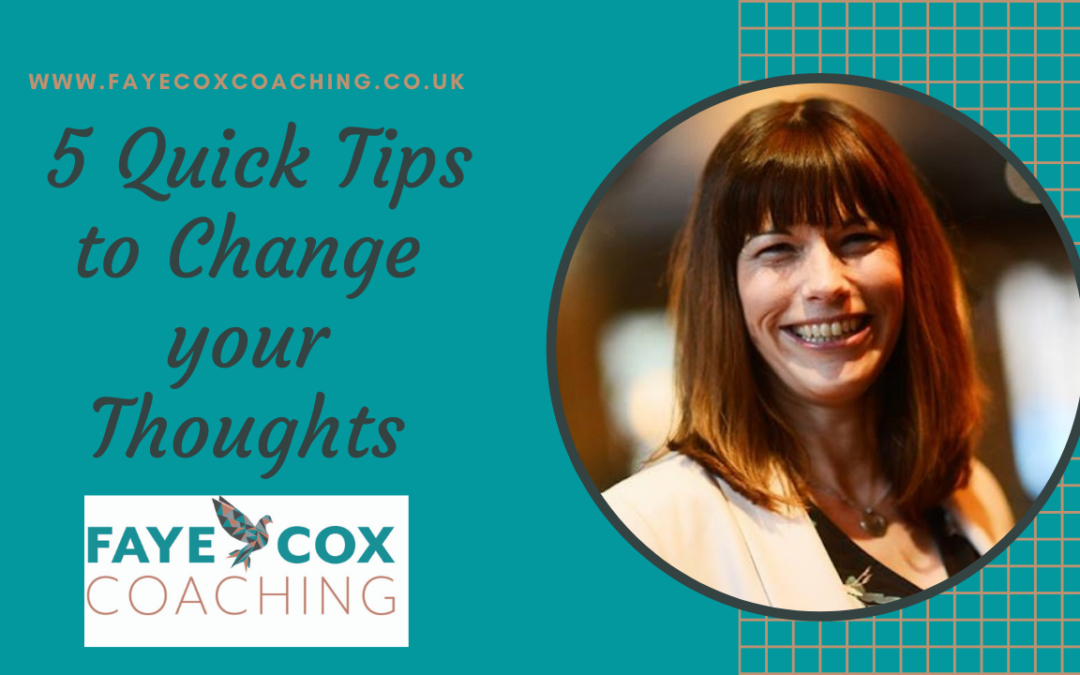
by Faye Cox | Jun 9, 2021 | Tips
“Change your thoughts to change your life!”
Now you might be surprised at how often during the day you focus on a negative thought. The average person has 50,000 to 70,000 thoughts per day. So it’s no surprise that this can get out of hand pretty quickly.
The best thing you can do to stop negative thoughts, is try and become more aware of those times that you are thinking in a negative manner.
Your life is a reflection of everything you have programmed into your mind over the course of your life up until now. You have been programmed, every second of every day from the very minute that you are born. You’re being programmed with both your internal thoughts, and your external thoughts. Those internal thoughts are the ones that drive you. And in a nutshell, you are what you think you are.

Now your unconscious beliefs and thought patterns, literally shape the whole world around you, each and every second. Much like a broken record, your thoughts get stuck on what your problems are. And you can then lose the ability to break out of this negative cycle. This never ending cycle becomes your way of life. So you literally think yourself into creation. This then becomes the song that you sing, and the dance that you dance when you’re stuck in a cycle of despair. When we’re stuck in this cycle, all we can really do and all you’re actually really doing is expanding the presence and giving more power to that despair. You’re tightening its grip on you until it gets to a point where your mind is controlling you, when what we want to do is we want to totally flip it so that you are in control of your mind.
That brings me nicely on to my five quick tips to help you change your thoughts – You can watch the video here!
Tip 1 – Is to identify those automatic negative thoughts that keep coming up again and again. Because your thoughts are directly linked to your feelings and your behaviours as a result of those feelings. So, your thoughts influence how you feel, which influences how you behave, so listening and writing down your negative thought patterns can help increase your awareness. The very first step to anything we do is becoming more aware and writing things down so we’re getting them out of our minds and onto paper. It’s one of the simplest but most effective ways that we can bring these thoughts in to your awareness. So list down those thoughts that keep coming up for you, just simply write them down.
Tip 2 – Is explore the cause of that negative thought process or pattern. These could even relate to your childhood. This could be stuff that has been programmed from such a young age, potentially from your parents. Your parents have always wanted to protect you so there will be certain things that they would have said to you when you were younger, such as, don’t talk to strangers, we all get taught stranger danger when we are younger and that keeps us safe, and it’s really really important to know that as children. But as we enter our adult lives and we start to go out and about and we start to meet new people, we start a new job, we’re in business and go networking or we’re wanting to build a wider circle of friends, we have to start getting comfortable with talking to people we don’t know. And this completely goes against that belief that we have been taught not to speak to strangers. And there’s so many different things like that, so we need to catch these thoughts to become aware of them to explore where they come from.
Tip 3 – Is to keep a record of those negative thoughts and try and come up with words or phrases that counteract it. So if we go back to where we might say you can’t do something. In my house, I teach my children not to use the words, I can’t, because the evidence shows that every time they tell themselves they can’t do something, there will have been another time when they have said it and proved themselves wrong and this happens every time, so now we use ‘I’ll give it a go‘ because let’s face it, how do we know if we can do something or not, unless we give it a go. I don’t tend to use the words I’ll try because I find that a bit wishy washy. But if I say to myself or my children say to themselves, I’ll give it a go. It makes you feel good, it’s an empowering kind of statement, it totally changes your state, and how you feel about something than saying, I can’t.

Tip 4 – is to use a tool such as NLP, or affirmations to help you think more positively. Now, through my series of videos, all of the videos that I create, are all to do with using my coaching and NLP techniques so if you subscribe to my You Tube channel to watch all my other videos, you’ll start to learn a lot more of these techniques to help you create more success in life but also to help you change the way you think and start believing in yourself more. List at least 10 negative thoughts that you’re having a day. This takes a little bit of time but as does everything. If you want anything to change. You have to practice. Repetition Repetition Repetition, the brain loves repetition. Now turn those thoughts on their head and creating a statement that better supports you .
Tip 5 – is chunking or breaking large amounts of information down into smaller pieces. Now sometimes our negative thoughts can be big thoughts they can be those ones that are ingrained from years and years of that negative repetition. And in order to reframe them and change them into a more positive, we may have to chunk them down. It’s like with any goal or anything that we’re trying to achieve, if you try and deal with something that is too big, all in one go. You’re going to get to a point where you’re banging your head against a brick wall, you’ll feel like you’re failing and can’t do it It sends you into overwhelm, so rather than carrying on and dealing with it. You give up. So, pick that bigger thought apart into smaller ones and deal with those smaller ones. Once you’ve done that you can chunk it back up, so that you can see the bigger picture of what it was that’s going on.
Practice these tips often until it becomes so natural that you can do it automatically in minutes. Use a journal to help if needs be. I have my own personal journal that you can purchase here.
Faye Cox Coaching – BELIEVING IN YOU UNTIL YOU DO TOO! If you’d like some support so you too can start believing in yourself, you can have a chat with me here










